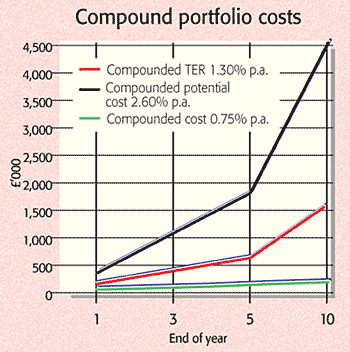Get the latest financial news, insights and expert analysis from our award-winning MoneyWeek team, to help you understand what really matters when it comes to your finances.
You are now subscribed
Your newsletter sign-up was successful
Want to add more newsletters?

Twice daily
MoneyWeek
Get the latest financial news, insights and expert analysis from our award-winning MoneyWeek team, to help you understand what really matters when it comes to your finances.

Four times a week
Look After My Bills
Sign up to our free money-saving newsletter, filled with the latest news and expert advice to help you find the best tips and deals for managing your bills. Start saving today!
Most fund managers would prefer you didn't know this, but the truth is that when it comes to investing, you're more likely to get a better return for your hard-earned money by putting it in an index tracker rather than the average actively managed fund. Take a look at these figures from Trustnet.com. In the 12 months to 31 March, the average UK unit trust (of 942 analysed) fell by 6.8%. The best, Newton Index-linked gilt, returned 16.5%, while the worst, SWIP's UK Real Estate, lost a hefty 43%.
This may not seem like earth-shattering news. Some fund managers make money, some don't that's only to be expected. But what if we were to tell you that over the same time period the FTSE All Share Index also fell 6.8%? That's right: in the year to the end of March, the average UK managed fund, which charges hefty fees in the name of adding value or alpha' to your investment, did no better than a tracker fund mimicking the movements of the index. In fact, when you take into account the low charges levied by trackers, the majority of actively managed funds did worse.
Unlike actively managed funds, trackers and their listed cousins - exchange-traded funds (ETFs) - don't employ expensive fund managers and teams of analysts to pore over balance sheets or take costly trips around the country to meet company management. They simply aim to imitate the performance of any given index. As a result, they have very low fees. For example, the F&C FTSE All-Share Tracker fund (020-7628 8000) has a total expense ratio (TER) of 0.28%, while the Lyxor FTSE All-Share ETF (LSE:FTAS) has a TER of 0.4%. By contrast, the run-of-the-mill actively-managed fund slaps on a TER of around about 1.5%.
MoneyWeek
Subscribe to MoneyWeek today and get your first six magazine issues absolutely FREE

Sign up to Money Morning
Don't miss the latest investment and personal finances news, market analysis, plus money-saving tips with our free twice-daily newsletter
Don't miss the latest investment and personal finances news, market analysis, plus money-saving tips with our free twice-daily newsletter

Doesn't sound like much? Well, take a look at the chart above, compiled by Martin Stirling of Grant Thornton, the chartered accountancy group, for Charity Finance. Looking at a hypothetical portfolio of £14m, he found that there was a wide divergence in costs even when the compounded fee differed by as little as 0.55%.
"A near-1% per annum additional return is needed by the active manager, simply to keep pace with the cheaper tracker funds," says Stirling, something that "would potentially require the manager to take greater risks".
Of course, he adds, by their very nature trackers won't outperform the market, which is what active managers hope to do. "But analysis shows that over the medium to long term, a portfolio of trackers will outperform the majority of active managers, especially when the additional cost of management is taken into account."
Get the latest financial news, insights and expert analysis from our award-winning MoneyWeek team, to help you understand what really matters when it comes to your finances.
MoneyWeek is written by a team of experienced and award-winning journalists, plus expert columnists. As well as daily digital news and features, MoneyWeek also publishes a weekly magazine, covering investing and personal finance. From share tips, pensions, gold to practical investment tips - we provide a round-up to help you make money and keep it.
-
 Should you buy an active ETF?
Should you buy an active ETF?ETFs are often mischaracterised as passive products, but they can be a convenient way to add active management to your portfolio
-
 Power up your pension before 5 April – easy ways to save before the tax year end
Power up your pension before 5 April – easy ways to save before the tax year endWith the end of the tax year looming, pension savers currently have a window to review and maximise what’s going into their retirement funds – we look at how

